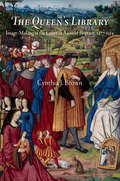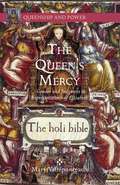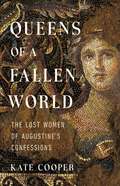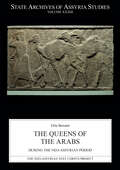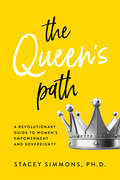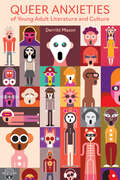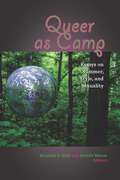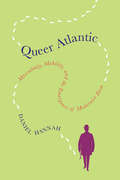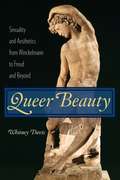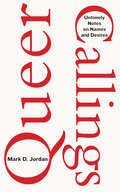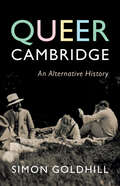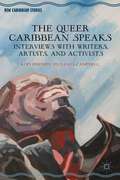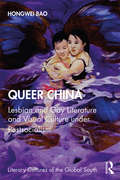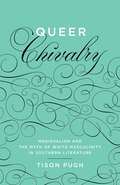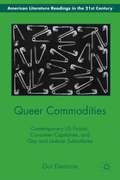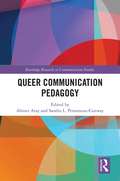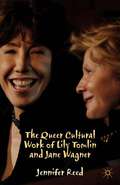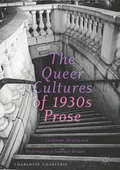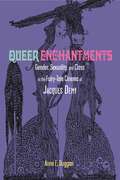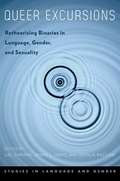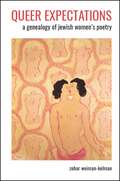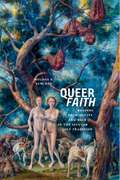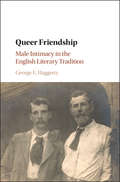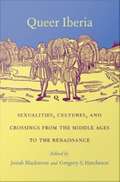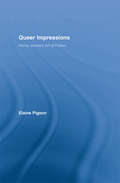- Table View
- List View
The Queen's Library: Image-Making at the Court of Anne of Brittany, 1477-1514 (Material Texts)
by Cynthia J. BrownWhat do the physical characteristics of the books acquired by elite women in the late medieval and early modern periods tell us about their owners, and what in particular can their illustrations—especially their illustrations of women—reveal? Centered on Anne, duchess of Brittany and twice queen of France, with reference to her contemporaries and successors, The Queen's Library examines the cultural issues surrounding female modes of empowerment and book production. The book aims to uncover the harmonies and conflicts that surfaced in male-authored, male-illustrated works for and about women.In her interdisciplinary investigation of the cultural and political legacy of Anne of Brittany and her female contemporaries, Cynthia J. Brown argues that the verbal and visual imagery used to represent these women of influence was necessarily complex because of its inherently conflicting portrayal of power and subordination. She contends that it can be understood fully only by drawing on the intersection of pertinent literary, historical, codicological, and art historical sources. In The Queen's Library, Brown examines depictions of women of power in five spheres that tellingly expose this tension: rituals of urban and royal reception; the politics of female personification allegories; the "famous-women" topos; women in mourning; and women mourned.
The Queen’s Mercy
by Mary VilleponteauxDuring the Elizabethan era, writers such as Shakespeare, Spenser, Sidney, Daniel, and others frequently expounded on mercy, exploring the sources and outcomes of clemency. This fresh reading of such depictions shows that the concept of mercy was a contested one, directly shaped by tensions over the exercise of judgment by a woman on the throne.
Queens of a Fallen World: The Lost Women of Augustine's Confessions
by Kate CooperFINALIST: THE CUNDILL HISTORY PRIZE 2023The vibrant and surprising lives of the women in Augustine's Confessions While many know of Saint Augustine and his Confessions, few are aware of how his life and thought were influenced by women.Queens of a Fallen World tells a story of betrayal, love, and ambition in the ancient world as seen through a woman's eyes. Historian Kate Cooper introduces us to four women whose hopes and plans collided in Augustine's early adulthood: his mother, Monnica of Thagaste; his lover; his fiancée; and Justina, the troubled empress of ancient Rome. Drawing upon their depictions in the Confessions, Cooper skilfully reconstructs their lives against the backdrop of their fourth-century society. Though they came from different walks of life, each found her own way of prevailing in a world ruled by men. A refreshingly complex and compelling portrait of Augustine, Queens of a Fallen World is the riveting story of four remarkable women who set him on course to change history.
The Queens of the Arabs During the Neo-Assyrian Period (State Archives of Assyria Studies)
by Ellie BennettThe title “Queen of the Arabs” is applied in Neo-Assyrian texts to five women from the Arabian Peninsula. These women led armies, offered tribute, and held religious roles in their communities from 738 to approximately 651 BCE. This book discusses what the title meant to the women who carried it and to the Assyrians who wrote about them.Whereas previous scholarship has considered the Queens of the Arabs in relation to the military and economic history of the Neo-Assyrian empire, Eleanor Bennett focuses on identity, using gender theory to locate points of the women’s alterity in Assyrian sources and to analyze how Assyrian cultural norms influenced the treatment of the “Queens of the Arabs.” This kind of analysis shows how Assyrian perceptions of the Queens of the Arabs, and of Arabian populations more generally, changed over time.As the Queens of the Arabs were located on the periphery of the Assyrian Empire, Bennett incorporates data from the Arabian Peninsula. The shift from an Assyrian lens to an Arabian one highlights inaccuracies in the Assyrian material, which brings into focus Assyrian misunderstandings of the region. The Arabian Peninsula also offers comparative models for the Queens of the Arabs based on Arabian cultures.
The Queen's Path: A Revolutionary Guide to Womens Empowerment and Sovereignty
by Stacey SimmonsA fascinating exploration of the Divided Woman, the key to understanding why women cannot take a hero&’s journey. Every woman battles being a Divided Woman, whether she is a stay-at-home mom or a high-powered corporate executive.In this book, psychotherapist Dr. Stacey Simmons explores the tracks women are placed on that turn them against themselves at a young age. Using fairy tales, stories, films, television, musicals, and the lives of her patients, Dr. Simmons reveals an ancient pattern hidden in plain sight for over a thousand years. She named it The Queen&’s Path, and in this book she explains how it has been used against women for millennia, and how women can turn the pattern to their advantage, and use it themselves to overcome obstacles and become the rightful queens of their own lives.Sovereignty—the ability to advocate for, and ultimately direct one&’s own life—is the realm every person longs for. There is a path to sovereignty for every woman who wants it, if she&’ll only place her glass slipper along The Queen&’s Path.The Queen&’s Path is a rare combination of both a guidebook and a story map to help anyone make sense of the world of women.
Queer Anxieties of Young Adult Literature and Culture (Children's Literature Association Series)
by Derritt MasonYoung adult literature featuring LGBTQ+ characters is booming. In the 1980s and 1990s, only a handful of such titles were published every year. Recently, these numbers have soared to over one hundred annual releases. Queer characters are also appearing more frequently in film, on television, and in video games. This explosion of queer representation, however, has prompted new forms of longstanding cultural anxieties about adolescent sexuality. What makes for a good “coming out” story? Will increased queer representation in young people’s media teach adolescents the right lessons and help queer teens live better, happier lives? What if these stories harm young people instead of helping them? In Queer Anxieties of Young Adult Literature and Culture, Derritt Mason considers these questions through a range of popular media, including an assortment of young adult books; Caper in the Castro, the first-ever queer video game; online fan communities; and popular television series Glee and Big Mouth. Mason argues themes that generate the most anxiety about adolescent culture—queer visibility, risk taking, HIV/AIDS, dystopia and horror, and the promise that “It Gets Better” and the threat that it might not—challenge us to rethink how we read and engage with young people’s media. Instead of imagining queer young adult literature as a subgenre defined by its visibly queer characters, Mason proposes that we see “queer YA” as a body of transmedia texts with blurry boundaries, one that coheres around affect—specifically, anxiety—instead of content.
Queer as Camp: Essays on Summer, Style, and Sexuality
by Kenneth B. Kidd Derritt MasonNamed the #1 Bestselling Non-Fiction Title by the Calgary HeraldTo camp means to occupy a place and/or time provisionally or under special circumstances. To camp can also mean to queer. And for many children and young adults, summer camp is a formative experience mixed with homosocial structure and homoerotic longing. In Queer as Camp, editors Kenneth B. Kidd and Derritt Mason curate a collection of essays and critical memoirs exploring the intersections of “queer” and “camp,” focusing especially on camp as an alternative and potentially nonnormative place and/or time. Exploring questions of identity, desire, and social formation, Queer as Camp delves into the diverse and queer-enabling dimensions of particular camp/sites, from traditional iterations of camp to camp-like ventures, literary and filmic texts about camp across a range of genres (fantasy, horror, realistic fiction, graphic novels), as well as the notorious appropriation of Indigenous life and the consequences of “playing Indian.” These accessible, engaging essays examine, variously, camp as a queer place and/or the experiences of queers at camp, including Vermont’s Indian Brook, a single-sex girls’ camp that has struggled with the inclusion of nonbinary and transgender campers and staff; the role of Jewish summer camp as a complicated site of sexuality, social bonding, and citizen-making as well as a potentially if not routinely queer-affirming place. They also attend to cinematic and literary representations of camp, such as the Eisner award-winning comic series Lumberjanes, which revitalizes and revises the century-old Girl Scout story; Disney’s Paul Bunyan, a short film that plays up male homosociality and cross-species bonding while inviting queer identification in the process; Sleepaway Camp, a horror film that exposes and deconstructs anxieties about the gendered body; and Wes Anderson’s critically acclaimed Moonrise Kingdom, which evokes dreams of escape, transformation, and other ways of being in the world. Highly interdisciplinary in scope, Queer as Camp reflects on camp and Camp with candor, insight, and often humor. Contributors: Kyle Eveleth, D. Gilson, Charlie Hailey, Ana M. Jimenez-Moreno, Kathryn R. Kent, Mark Lipton, Kerry Mallan, Chris McGee, Roderick McGillis, Tammy Mielke, Alexis Mitchell, Flavia Musinsky, Daniel Mallory Ortberg, Annebella Pollen, Andrew J. Trevarrow, Paul Venzo, Joshua Whitehead
Queer Atlantic: Masculinity, Mobility, and the Emergence of Modernist Form
by Daniel HannahThe instability of modernist form has everything to do with the social, political, and economic shakeups of the nineteenth century that left masculinity a site of contestation, racial anxiety, homophobic paranoia, performative display, and queer desire. Refusing to take white masculinity for granted, Daniel Hannah considers how the canonical novels of modernist fiction explore the ways that privilege is propped up and driven by factors of race, place, gender, and sexuality.Queer Atlantic examines the work of established writers – Herman Melville, Robert Louis Stevenson, Henry James, Joseph Conrad, and Ford Madox Ford – to reveal that anxieties surrounding white, masculine privilege and queer potential helped broaden the novel's formal possibilities. Demonstrating how masculine mobility, and often specifically transatlantic mobility, both enacts and queerly disorients male privilege, Hannah places these writers in the context of debates about naval impressment, piracy, emigration, colonization, and the "new imperialism." In the process he raises important questions about the current field of queer ethics, highlighting the strange companionship of queer openness to otherness and imperialist thought in modernist writing.Arguing for the surprising resilience of such fictional structures, Queer Atlantic provides a new understanding of modernism's emergence from a troubling of masculine privilege, mobility, and desire.
Queer Beauty: Sexuality and Aesthetics from Winckelmann to Freud and Beyond (Columbia Themes in Philosophy, Social Criticism, and the Arts)
by Whitney DavisThe pioneering work of Johann Winckelmann (1717-1768) identified a homoerotic appreciation of male beauty in classical Greek sculpture, a fascination that had endured in Western art since the Greeks. Yet after Winckelmann, the value (even the possibility) of art's queer beauty was often denied. Several theorists, notably the philosopher Immanuel Kant, broke sexual attraction and aesthetic appreciation into separate or dueling domains. In turn, sexual desire and aesthetic pleasure had to be profoundly rethought by later writers. Whitney Davis follows how such innovative thinkers as John Addington Symonds, Michel Foucault, and Richard Wollheim rejoined these two domains, reclaiming earlier insights about the mutual implication of sexuality and aesthetics. Addressing texts by Arthur Schopenhauer, Charles Darwin, Oscar Wilde, Vernon Lee, and Sigmund Freud, among many others, Davis criticizes modern approaches, such as Kantian idealism, Darwinism, psychoanalysis, and analytic aesthetics, for either reducing aesthetics to a question of sexuality or for removing sexuality from the aesthetic field altogether. Despite these schematic reductions, sexuality always returns to aesthetics, and aesthetic considerations always recur in sexuality. Davis particularly emphasizes the way in which philosophies of art since the late eighteenth century have responded to nonstandard sexuality, especially homoeroticism, and how theories of nonstandard sexuality have drawn on aesthetics in significant ways. Many imaginative and penetrating critics have wrestled productively, though often inconclusively and "against themselves," with the aesthetic making of sexual life and new forms of art made from reconstituted sexualities. Through a critique that confronts history, philosophy, science, psychology, and dominant theories of art and sexuality, Davis challenges privileged types of sexual and aesthetic creation imagined in modern culture-and assumed today.
Queer Callings: Untimely Notes on Names and Desires
by Mark D. JordanCHOICE: OUTSTANDING ACADEMIC TITLEFINALIST, THE RANDY SHILTS AWARD FOR GAY NONFICTION, THE PUBLISHING TRIANGLE AWARDSA passionate exhortation to expand the ways we talk about human sex, sexuality, and gender.Twenty-five years ago, Mark D. Jordan published his landmark book on the invention and early history of the category “sodomy,” one that helped to decriminalize certain sexual acts in the United States and to remove the word sodomy from the updated version of a standard English translation of the Christian Bible. In Queer Callings, Jordan extends the same kind of illuminating critical analysis to present uses of “identity” with regard to sexual difference. While the stakes might not seem as high, he acknowledges, his newest history of sexuality is just as vital to a better present and future.Shaking up current conversations that focus on “identity language,” this essential new book seeks to restore queer languages of desire by inviting readers to consider how understandings of “sexual identity” have shifted—and continue to shift—over time. Queer Callings re-reads texts in various genres—literary and political, religious and autobiographical—that have been preoccupied with naming sex/gender diversity beyond a scheme of LGBTQ+ identities. Engaging a wide range of literary and critical works concerned with sex/gender self-understanding in relation to “spirituality,” Jordan takes up the writings of Oscar Wilde, Marcel Proust, Djuna Barnes, Samuel R. Delany, Audre Lorde, Geoff Mains, Eve Kosofsky Sedgwick, Gloria Anzaldúa, Maggie Nelson, and others.Before it’s possible to perceive sexual identities differently, Jordan argues, current habits for classifying them have to be disrupted. In this way, Queer Callings asks us to reach beyond identity language and invites us to re-perform a selection of alternate languages—some from before the invention of phrases like “sexual identity,” others more recent. Tracing a partial genealogy for “sexual identity” and allied phrases, Jordan reveals that the terms are newer than we might imagine. Many queer folk now counted as literary or political ancestors didn’t claim a sexual or gender identity: They didn’t know they were supposed to have one. Finally, Queer Callings joins the writers it has evoked to resist any remaining confidence that it’s possible to give neatly contained accounts of human desire. Reaching into the past to open our eyes to extraordinary opportunities in our present and future, Queer Callings is a generatively destabilizing and essential read.
Queer Cambridge: An Alternative History
by Simon GoldhillQueer Cambridge recounts the untold story of a gay community living, for many decades, at the very heart of the British Establishment. Making effective use of chiefly forgotten archival sources – including personal diaries and letters – the author reveals a network that was in equal parts tolerant and acerbic, and within which the queer Fellows of Cambridge University explored bold new forms of camaraderie and relationship. Goldhill examines too the huge influence that these individuals had on British culture, in its arts, politics, music, theatre and self-understanding. During difficult decades when homosexuality was unlawful, gay academics – who included celebrated literary and scientific figures like E. M. Forster, M. R. James, Rupert Brooke and Alan Turing – lived, loved, and grew old together, bringing new generations into their midst. Their remarkable stories add up not just to an alternative history of male homosexuality in Britain, but to an alternative history of Cambridge itself.
The Queer Caribbean Speaks
by Kofi Omoniyi Sylvanus CampbellIn most Caribbean countries homosexuality is still illegal and many outside of the region are unaware of how difficult life can be for gay men and lesbians. This book collects interviews with queer Caribbean writers, activists, and citizens and challenges the dominance of Euro-American theories in understanding global queerness.
Queer China: Lesbian and Gay Literature and Visual Culture under Postsocialism (Literary Cultures of the Global South)
by Hongwei BaoThis book analyses queer cultural production in contemporary China to map the broad social transformations in gender, sexuality and desire. It examines queer literature and visual cultures in China’s post-Mao and postsocialist era to show how these diverse cultural forms and practices not only function as context-specific and culturally sensitive forms of social activism but also produce distinct types of gender and sexual subjectivities unique to China’s postsocialist conditions. From poetry to papercutting art, from ‘comrade/gay literature’ to girls’ love fan fiction, from lesbian films to activist documentaries, and from a drag show in Shanghai to a public performance of a same-sex wedding in Beijing, the book reveals a queer China in all its ideological complexity and creative energy. Empirically rich and methodologically eclectic, Queer China skilfully weaves together historical and archival research, textual and discourse analysis, along with interviews and ethnography. Breaking new ground and bringing a non-Western perspective to the fore, this transdisciplinary work contributes to multiple academic fields including literary and cultural studies, media and communication studies, film and screen studies, contemporary art, theatre and performance studies, gender and sexuality studies, China/Asia and Global South studies, cultural history and cultural geography, political theory and the study of social movements.
Queer Chivalry: Medievalism and the Myth of White Masculinity in Southern Literature (Southern Literary Studies)
by Tison PughFor the U.S. South, the myth of chivalric masculinity dominates the cultural and historical landscape. Visions of white southern men as archetypes of honor and gentility run throughout regional narratives with little regard for the actions and, at times, the atrocities committed by such men. In Queer Chivalry, Tison Pugh exposes the inherent contradictions in these depictions of cavalier manhood, investigating the foundations of southern gallantry as a reincarnated and reauthorized version of medieval masculinity. Pugh argues that the idea of masculinity -- particularly as seen in works by prominent southern authors from Mark Twain to Ellen Gilchrist -- constitutes a cultural myth that queerly demarcates accepted norms of manliness, often by displaying the impossibility of its achievement. Beginning with Twain's famous critique of "the Sir Walter disease" that pilloried the South, Pugh focuses on authors who questioned the code of chivalry by creating protagonists whose quests for personal knighthood prove quixotic. Through detailed readings of major works -- including Twain's A Connecticut Yankee in King Arthur's Court, Flannery O'Connor's short fiction, John Kennedy Toole's A Confederacy of Dunces, Robert Penn Warren's A Place to Come To, Walker Percy's novels, and Gilchrist's The Annunciation -- Pugh demonstrates that the hypermasculinity of white-knight ideals only draws attention to the ambiguous gender of the literary southern male.Employing insights from gender and psychoanalytic theory, Queer Chivalry contributes to recent critical discussions of the cloaked anxieties about gender and sexuality in southern literature. Ultimately, Pugh uncovers queer limits in the cavalier mythos, showing how facts and fictions contributed to the ideological formulation of the South.
Queer Commodities
by Guy DavidsonQueer Commoditiesis the first book-length analysis of same-sexuality and consumer capitalism in contemporary US fiction. Moving beyond the critical tendencies to identify gay and lesbian subcultures as either hopelessly immersed in consumer capitalism or heroically resistant to it, Guy Davidson argues that while these subcultures are necessarily commodified, they also provide means of subversively negotiating aspects of life under capitalism.
Queer Communication Pedagogy (Routledge Research in Communication Studies)
by Ahmet Atay Sandra L. Pensoneau-ConwayThis book addresses queer issues and current events from a communication perspective to articulate a queer communication pedagogy. Through putting communication pedagogy and queer studies into dialogue, the book investigates how queer theory and critical communication pedagogy intersect in pedagogical spaces. The chapters identify institutional and educational barriers, oppressions, and issues pertaining to queer lives in the context of higher education. Using a variety of critical methodological approaches (including dialogic methods, autoethnography, performative writing, and visual methods), each chapter theorizes a queer communication pedagogy, and offers a path toward and innovative ideas about materializing queer communication pedagogy as a disciplinary endeavor. This book will be of interest to scholars, graduate students, and upper-level undergraduate students in Communication Studies, Critical Communication Pedagogy, Intercultural Communication, Higher Education, Public Pedagogy, and Queer Studies, and Critical/Cultural Studies.
The Queer Cultural Work Of Lily Tomlin And Jane Wagner
by Jennifer ReedLily Tomlin and Jane Wagner have been partners in life and work for more than forty years. Over those years they have been comedic pioneers in television, sound recording, film, theatre, and animation. They have won numerous prestigious awards and endeared themselves to generations of Americans. Although Lily Tomlin is the famous one-Ernestine ('Have I reached the party to whom I am speaking?') and Edith Ann ('And that's the truth. ') - her most meaningful work has been created in partnership with Jane Wagner. This book explores the ways they have used and expanded notions of queer to make their unique impact on American culture.
The Queer Cultures of 1930s Prose: Language, Identity and Performance in Interwar Britain
by Charlotte CharterisOffering a radical reassessment of 1930s British literature, this volume questions the temporal limits of the literary decade, and broadens the scope of queer literary studies to consider literary-historical responses to a variety of behaviours encompassed by the term ‘queer’ in its many senses. Whilst it is informed by the history of sexuality in twentieth-century Europe, it is also profoundly concerned with what Christopher Isherwood termed ‘the market value of the Odd.’ Drawing, for its methodology, on the work of Raymond Williams, it traces the impact of the Great War on the development of language, examining the use of ten ‘keywords’ in the prose of Christopher Isherwood, Evelyn Waugh and Patrick Hamilton, and that of their respective literary milieux, in order to establish how queer lives and modern sub-cultural identities were forged collaboratively within the fictional realm. By utilizing contemporary perspectives on performativity in conjunction with detailed close readings it repositions these authors as self-conscious agents actively producing their own queer masculinities through calculated acts of linguistic transgression.
Queer Enchantments: Gender, Sexuality, and Class in the Fairy-Tale Cinema of Jacques Demy
by Anne E. DugganTo the uninitiated, the films of French New Wave director Jacques Demy can seem strange and even laughable, with their gaudy color schemes and sung dialogue. Yet since the late 1990s, a generation of queer filmmakers in France have found new inspiration in Demy's cinema. In this volume, author Anne E. Duggan examines Jacques Demy's queer sensibility in connection with another understudied characteristic of his oeuvre: his recurrent use of the fairy tale. In Queer Enchantments: Gender, Sexuality, and Class in the Fairy-Tale Cinema of Jacques Demy, Duggan demonstrates that Demy uses fairy-tale devices to explore and expand the identity categories of his characters, while he broadens the possibilities of the genre of the fairy tale through his cinematic revisions. In each chapter, Duggan examines how Demy strategically unfolds, challenges, and teases out the subversive qualities of fairy-tale paradigms. In chapter 1, Duggan reads Demy's Lola and The Umbrellas of Cherbourg through the lens of "Cinderella" and "Sleeping Beauty," while in chapter 2, she explores Demy's revision of Charles Perrault's "Donkey Skin" from the particular angle of gay aesthetics. In chapter 3, Duggan situates Demy's rendition of The Pied Piper in relation to a specifically Franco-American tradition of the legend, which thus far has not received critical attention. Finally, in Chapter 4, she examines the ways in which Demy's Lady Oscar represents the undoing of the figure of the maiden warrior. An epilogue reads Demy's fairy-tale cinema as exemplary of the postmodern tale. Duggan shows that Demy's cinema heightens the inherent tensions and troubles that were already present in fairy-tale texts and uses them to illustrate both the constraints and utopian possibilities of the fairy tale. Both film and fairy-tale studies scholars will enjoy Duggan's fresh look at the distinctive cinema of Jacques Demy.
Queer Excursions: Retheorizing binaries in Language, Gender, and Sexuality (Studies in Language and Gender, and Sexuality series)
by Lal Zimman Joshua Raclaw Jenny L. DavisThe chapters in Queer Excursions offer a series of distinct perspectives on these binaries, as well as on a number of other, less immediately apparent dichotomies that nevertheless permeate the gendered and sexual lives of speakers. Several chapters focus on the limiting or misleading qualities of bi-naristic analyses, while others suggest that binaries are a crucial component of social meaning within particular communities of study.
Queer Expectations: A Genealogy of Jewish Women's Poetry (SUNY series in Contemporary Jewish Literature and Culture)
by Zohar Weiman-KelmanJewish women have had a fraught relationship with history, struggling for inclusion while resisting their limited role as (re)producers of the future. In Queer Expectations, Zohar Weiman-Kelman shows how Jewish women writers turned to poetry to write new histories, developing "queer expectancy" as a conceptual tool for understanding how literary texts can both invoke and resist what came before. Bringing together Jewish women's poetry from the late nineteenth century, the interwar period, and the 1970s and 1980s, Weiman-Kelman takes readers on a boundary-crossing journey through works in English, Yiddish, and Hebrew, setting up encounters between writers of different generations, locations, and languages. Queer Expectations highlights genealogical lines of continuity drawn by authors as diverse as Emma Lazarus, Kadya Molodowsky, Leah Goldberg, Anna Margolin, Irena Klepfisz, and Adrienne Rich. These poets push back against heteronormative imperatives of biological reproduction and inheritance, opting instead for connections that twist traditional models of gender and history. Looking backward in queer ways enables new histories to emerge, intervenes in a troubled present, and gives hope for unexpected futures.
Queer Faith: Reading Promiscuity and Race in the Secular Love Tradition (Sexual Cultures #52)
by Melissa E. SanchezHonorable Mention, 2020 Aldo and Jeanne Scaglione Prize, given by the Modern Language AssociationUncovers the queer logics of premodern religious and secular textsPutting premodern theology and poetry in dialogue with contemporary theory and politics, Queer Faith reassess the commonplace view that a modern veneration of sexual monogamy and fidelity finds its roots in Protestant thought. What if this narrative of “history and tradition” suppresses the queerness of its own foundational texts? Queer Faith examines key works of the prehistory of monogamy—from Paul to Luther, Petrarch to Shakespeare—to show that writing assumed to promote fidelity in fact articulates the affordances of promiscuity, both in its sexual sense and in its larger designation of all that is impure and disorderly. At the same time, Melissa E. Sanchez resists casting promiscuity as the ethical, queer alternative to monogamy, tracing instead how ideals of sexual liberation are themselves attached to nascent racial and economic hierarchies. Because discourses of fidelity and freedom are also discourses on racial and sexual positionality, excavating the complex historical entanglement of faith, race, and eroticism is urgent to contemporary queer debates about normativity, agency, and relationality.Deliberately unfaithful to disciplinary norms and national boundaries, this book assembles new conceptual frameworks at the juncture of secular and religious thought, political and aesthetic form. It thereby enlarges the contexts, objects, and authorized genealogies of queer scholarship. Retracing a history that did not have to be, Sanchez recovers writing that inscribes radical queer insights at the premodern foundations of conservative and heteronormative culture.
Queer Friendship: Male Intimacy in the English Literary Tradition
by George E. HaggertyFriendship in the classical world was celebrated as among the highest human achievements: nothing was more likely to lead to the divine than looking for it in the eyes of a friend. In exploring the complexities of male-male relations beyond the simple labels of sexuality, Queer Friendship shows how love between men has a rich and varied history in English literature. The friend could offer a reflection of one's own worth and a celebration of a kind of mutuality that was not connected to family or home. These same-sex friendships are memorable because they give shape to the novels of which they are a part, and question the assumption that the love between friends is different from the love between lovers. Queer Friendship explores English literary friendship in three ways: the elegiac, the erotic, and the platonic, by considering a myriad of works, including Sterne's Tristram Shandy, Tennyson's 'In Memoriam A. H. H.', and Dickens' Great Expectations.
Queer Iberia: Sexualities, Cultures, and Crossings from the Middle Ages to the Renaissance
by Josiah Blackmore Gregory S. HutchesonMartyred saints, Moors, Jews, viragoes, hermaphrodites, sodomites, kings, queens, and cross-dressers comprise the fascinating mosaic of historical and imaginative figures unearthed in Queer Iberia. The essays in this volume describe and analyze the sexual diversity that proliferated during the period between the tenth and the sixteenth centuries when political hegemony in the region passed from Muslim to Christian hands. To show how sexual otherness is most evident at points of cultural conflict, the contributors use a variety of methodologies and perspectives and consider source materials that originated in Castilian, Latin, Arabic, Catalan, and Galician-Portuguese. Covering topics from the martydom of Pelagius to the exploits of the transgendered Catalina de Erauso, this volume is the first to provide a comprehensive historical examination of the relations among race, gender, sexuality, nation-building, colonialism, and imperial expansion in medieval and early modern Iberia. Some essays consider archival evidence of sexual otherness or evaluate the use of "deviance" as a marker for cultural and racial difference, while others explore both male and female homoeroticism as literary-aesthetic discourse or attempt to open up canonical texts to alternative readings. Positing a queerness intrinsic to Iberia's historical process and cultural identity, Queer Iberia will challenge the field of Iberian studies while appealing to scholars of medieval, cultural, Hispanic, gender, and gay and lesbian studies. Contributors. Josiah Blackmore, Linde M. Brocato, Catherine Brown, Israel Burshatin, Daniel Eisenberg, E. Michael Gerli, Roberto J. Gonzlez-Casanovas, Gregory S. Hutcheson, Mark D. Jordan, Sara Lipton, Benjamin Liu, Mary Elizabeth Perry, Michael Solomon, Louise O. Vasvri, Barbara Weissberger
Queer Impressions: Henry James' Art of Fiction (Studies in Major Literary Authors)
by Elaine PigeonBeginning with The Portrait of a Lady, this book shows how, in developing his unique form of realism, James highlights the tragic consequences of his American heroine's Romantic imagination, in particular, her Emersonian idealism. In order to expose Emerson's blind spot, a lacuna at the very centre of his New England Transcendentalism, James draws on the Gothic effects of Nathaniel Hawthorne and Edgar Allan Poe, thereby producing an intensification of Isabel Archer's psychological state and precipitating her awakening to a fuller, heightened consciousness. Thus Romanticism takes an aesthetic turn, becoming distinctly Paterian and unleashing queer possibilities that are further developed in James's subsequent fiction. This book follows the Paterian thread, leading to The Author of Beltraffio and Théophile Gauthier, and thereby establishing an important connection with French culture. Drawing on James's famous analogy between the art of fiction and the art of the painter, the book explores a possible link to the Impressionist painters associated with the literary circle Émile Zola dominated. It then turns to A New England Winter, a tale about an American Impressionist painter, and finds traces leading back to James's initiation prèmiere. The book closes with an exploration of the possible sources of Kate Croy's unspeakable father in The Wings of the Dove and proposes a possible intertext, one that provides direct insight into the Victorian closet.
